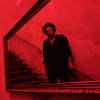The above headline is not exactly true, but Destroyer’s 2008 album Trouble in Dreams, which came on the heels of the universally loved Rubies, didn't get so much attention. I couldn't tell you why, necessarily. It wasn't bad by any means, but it does sort of tread water. Destroyer's Dan Bejar is known for switching things up pretty much every record, and Trouble in Dreams felt like a more compact version of Rubies.
The first time I heard it, I was wandering alone through Vancouver, Canada, where Bejar lives, on one of the wettest days I can remember. I remember hearing the opening lines of "Blue Flower/Blue Flame," Okay fine, even the sky looks like wine, and everywhere I turn there's a new face in time, stuck inside the well.... The sky didn't look at all like wine just then. I was cold, and my socks were wet, but something about Bejar's lyrical concession—like he had to just finally admit that looking up at the sky can be pretty beautiful despite whatever else might have been going on in his mind—really hit home. Across the rest of the album there are all these weird, sticky lyrics that aren't actually very confessional, but through some combination of instrumental focus and vocal inflection, they come off as the realest Bejar ever got.
Some examples:
I've got street despair carved into my heart from "Shooting Rockets (From The Desk of Night's Ape)"
See the sun crawling over the sky, keep an eye on the surf and the sea and the sand, don't you know every night is a stand-off with the fucking horizon... from "Rivers"
Pretty much the entire album was Dan Bejar grappling with demons (personal or otherwise, it's hard to tell with him) through his relationship to the outside world. The sun and sky figure prominently—as do city streets and plain statements about fucking up.
In an interview with Pitchfork around the release of Kaputt, which came out three years after Trouble in Dreams, Bejar spoke about his uneasiness about the songs on Trouble in Dreams:
"It was a feeling that started to creep into me—that I was doomed if I was to persist. I know my last record, Trouble in Dreams, has my strongest lyric sheet. But I also know that, as a record, there's something off about it, which is fine. But I had trouble singing it in a lot of ways."
Who even knows what that "something off" might be, but it's possible that it was Bejar at his most direct and honest, tapping into this idea of lost love and adult uncertainty in a way that was so obvious that it made him uncomfortable to revisit those songs. That's pure speculation on my part, but I think it's important to recognize that the album is his most unambitious—less interested in playing with structure and genre tropes and more interested in crafting songs as just songs. It's the album equivalent of a short story. Unfussy and to the point.



